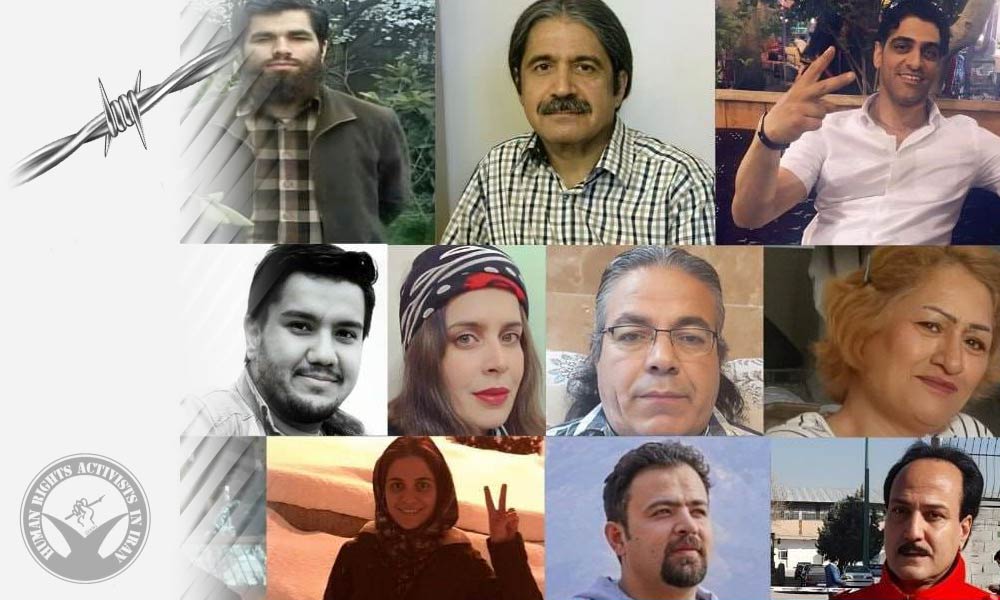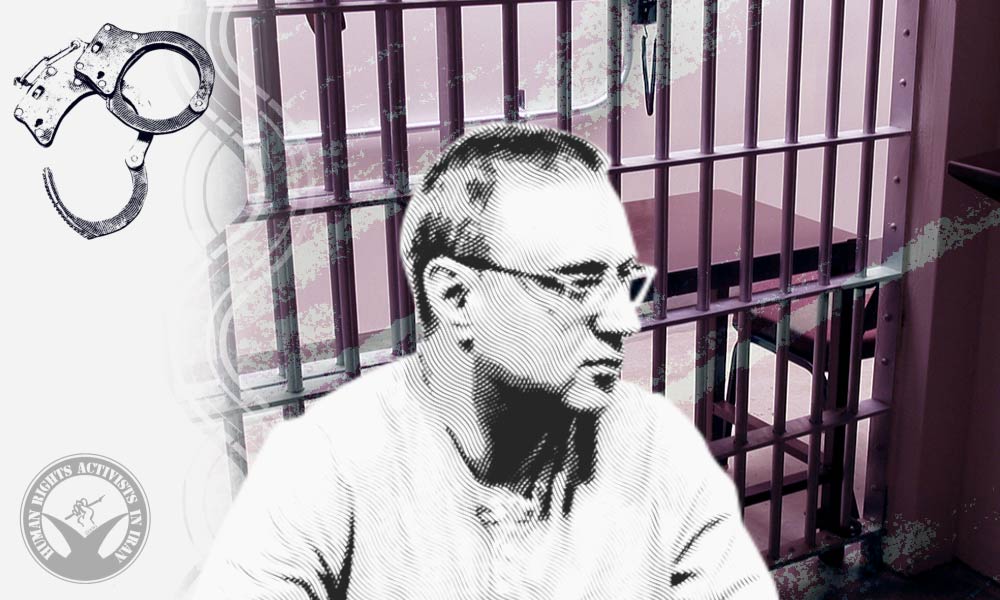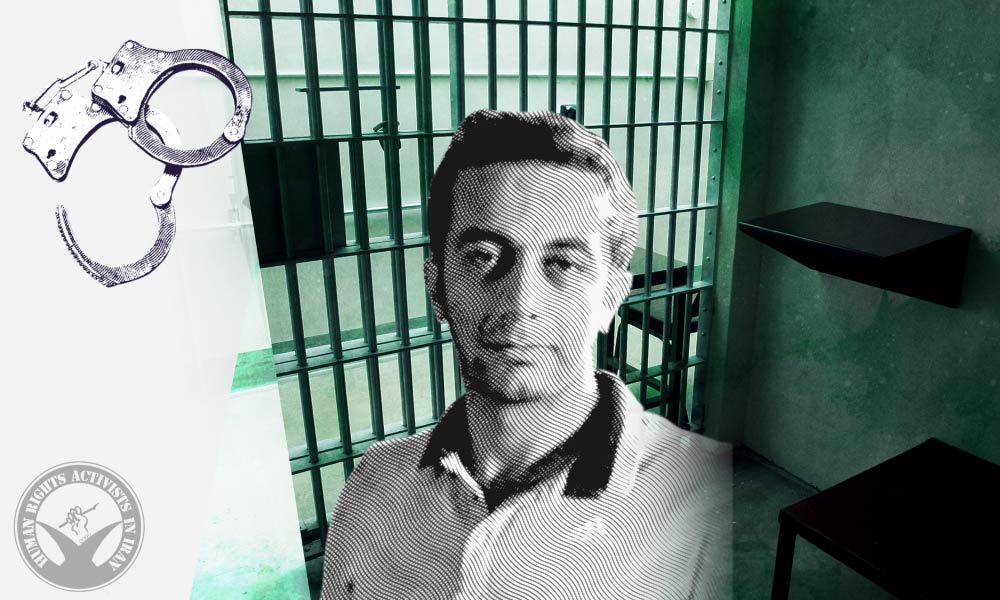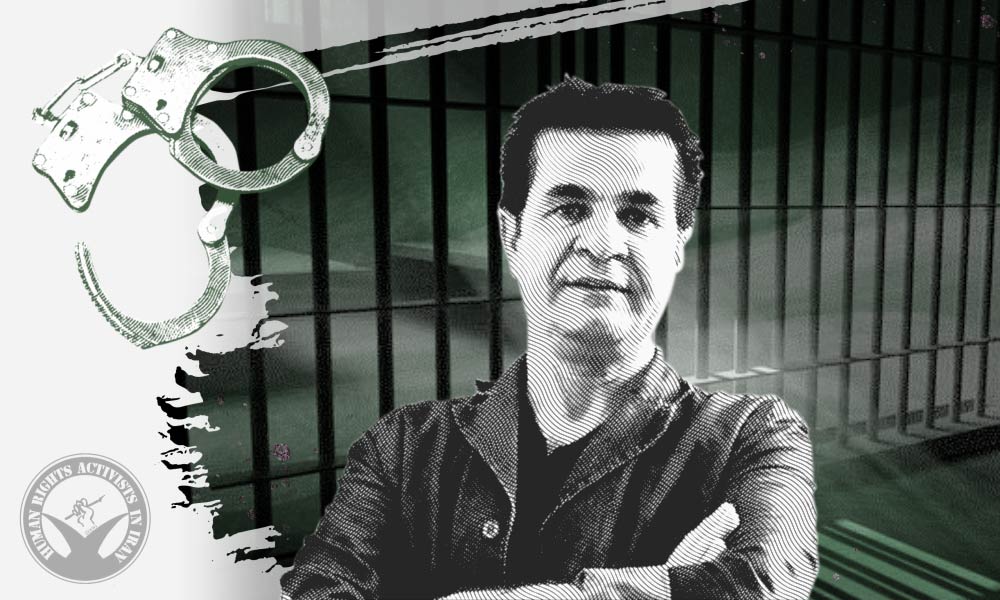Ebrahim Raisi is a former Custodian and Chairman of Astan Quds Razavi from 2016 to 2019 and a member of so-called “death commission” during the 1988 executions which were series of state-sponsored execution of political prisoners across the country. He succeeded Sadegh Larijani as the Judiciary Chief (the head of judicial system of Iran) in 2019. Being appointed as the Judiciary Chief by the Supreme leader, Ebrahim Raisi claimed that he wants the Iranian people to taste “the sweet flavor of justice” by reforming the judicial system to bring more justice and fairness. Six months after being appointed to the new position, the verdicts of political prisoners indicate that the pressure is increased on the civil rights activists and opposition groups in Iran. During six months of Ebrahim Raisi in office, political activists were sentenced to 1,027 years in prison and 1428 lashes. Therefore, the verdicts targeting civil rights activists and opposition groups were increased by 119% compared to a similar time period during his predecessor, Sadegh Larijani, who was in office for nine and half years. Although Larijani faced massive demonstrations such as uprisings across the country in January 2017 and August 2018, protests in the Khuzestan province, and Dervishes protests which Raisi has not faced any yet.
Statistics Comparison of Verdicts with the Former Judiciary Chief
The following is a summary of verdicts between March 8, 2019 to September 8, 2019 which was gathered and analyzed by the Department of Statistics and Publication of the Human Rights Activists in Iran (HRAI): According to statistics, during this period, both sentences against political and civil activists or years of sentences were increased. 211 political or civil activists including advocates of freedom of expression, women rights activists, syndicates activists, students, ethnicity rights activists, labor rights activists, minority rights advocates, and religion activists were sentenced by the Revolutionary Court across the country to 1027 and six months of imprisonment, 418 million and 350 thousand Tomans of fines, and 428 lashes. Out of these numbers, 966 years and 8 months in prison sentences and 30 years and 10 months are suspended prison sentences. In comparison to the same period when Larijani was the Judiciary Chief, March 8 to September 8, 2018, 278 political and civil activists were sentenced to 468 years and one month in prison, 254 million Tomans fines, and 891 lashes. This comparison is based on the numbers of individual cases but mass sentences for the arrestees of uprisings such as 232 verdicts of Gonabadi dervishes in the case of so-called “Golestan Haftom” have been excluded. Overall, these statistics indicated that although the number of arrestees has been decreased in Raisi’s term but the average number of verdicts in comparison to the same period in the Larijani’s term has been increased.
The Names of 211 Activists Who Were Sentenced to Prison Term or Lashes During Ebrahim Raeissi’s term
Kiumars Marzban, Shima Babai Zeydi, Dariush Abdar, Mahmood Masoumi, Behnam Mousavand, Saeed Eghbali, Mojgan Lali, Saeed Seyfi Jahan, Shaghayegh Makai, Nader Afshari, Anoushah Ashouri, Ali Johari, Marzieh Amiri, Ishaq Rouhi, Mohammad Saber Malek Raeissi, Shir Ahmad Shirani, Kamal Jafari Yazdi, Aras Amiri, Nejat Bahrami, Sadegh Zibaklam, Hamed Ayenehvand, Roozbeh Meshkinkhat, Mohammad Reza Aghajari, Nima Saffar, Khalil Karimi, Mehdi Moghadari, Golraki Ebrahimi Irai, Athena Daemi, Mohammad Reza Khatami, Mohammad Potaiesh, Khadijeh (Leila) Mirghafari, Reza Makian (Malek), Hashem Zeinali, Simin Eyvazzadeh, Ehsan Kheybar, Abdul Azim Arouji, Mohsen Haseli, Mohsen Shojai, Azam Najafi, Parvin Soleimani, Sharmin Yomni, Sara Saei, Arshia Rahmati, Masoud Hamidi, Ali Babai, Ismail Hosseini Koohkamarai, Farideh Toosi, Zahra Modarreszadeh, Amir Mahdi Jalayeri, Mohammad Najafi, Javad Lari, Rahim Mohammadpour, Masoud Kazemi, Sahar Kazemi, Amir Salar Davoodi, Milad Mohammad Hosseini, Abdollah Ghasimpour, Mohammad Hossein Ghasempour, Alireza Habibi, Baktash Abtin, Reza Khand Mahabadi, Keyvan Bajan, Yousef Salahshour, Davood Mahmoodi, Mohammad Asri, Siavash Rezaian, Najaf Mehdipour, Behrooz Zare, Ata’ollah Ahsani, Abbas Nouri Shadkam, Ali Bagheri, Masoud Ajloo, Behzad Ali Bakhshi, Kianoush Ghahramani, Nariman Noroozi, Rezvaneh Ahmad Khanbeigi, Amir Mahdi Sedighara, Ali Amin Amlashi, Barzan Mohammadi, Arsham Rezai, Nasrin Sotoudeh, Michael White, Abolfazl Ghadyani, Nader Fotourehchi, Farhad Sheykhi, Mardas Taheri, Aliyeh Eghdam Doost, Rasoul Bodaghi, Esmail Gerami, Javad Zolnouri, Hossein Gholami, Rahman Abed, Asghar Amirzadegani, Hamid Reza Rahmati, Eghbal Shabani, Mohammad Ali Zahmatkesh, Fatemeh Mohammadi, Bahman Kord, Sina Darvish Omran, Ali Mozafari, Leila Hosseinzadeh, Mojtaba Dadashi, Mohammad Rasoulof, Hossein Janati, Omid Asadi, Sahand Moali, Mohammad Mirzai, Bapir Barzeh, Shirko Ali Mohammadi, Keyvan Nejadrasoul, Tohid Amir Amini, Kianoush Aslani, Abbas Lesani, Mobinollah Veysi, Mojtaba Parvin, Kazem Safabakhsh, Rahim Gholami, Jafar Rostami, Aref Mohammadi, Peyman Mirzazadeh, Samko Jafari, Behzad Shahsavar, Siamand Shahsavar, Salman Afra, Shaker Maravi, Khaled Hosseini, Rasoul Taleb Moghadam, Hasan Saeedi, Hossein Ansari Zadeh, Feisal Saalebi, Saab Zahiri, Adel Samaei, Esmail Jaadeleh, Bani Naami, Omid Azadi, Rostam Abdollah Zadeh, Ali Bani Sadeh, Nasrin Javadi, Tofigh Mahmoudi, Davood Razavi, Amanollah Balochi, Farough Izadi Nia, Moein Mohammadi, Sheida Abedi, Firouz Ahmadi, Khalil Malaki, Simin Mohammadi, Bijan Ahmadi, Maryam Mokhtari, Saghar Mohammadi, Sohrab Malaki, Bahman Salehi, Sofia Mombini, Negin Tadrisi, Kheirollah Bakhshi, Shabnam Issa Khani, Shahryar Khodapanah, Farzad Bahadori, Kambiz Misaghi, Monika Alizadeh, Mino Riazati, Asadollah Jaberi, Ehteram Sheykhi, Emad Jaberi, Farideh Jaberi, Farokhlegha Faramarzi, Pooneh Nasheri, Saba Kord Afshari, Yasaman Aryani, Monireh Arabshahi, Mojgan Keshavarz, Vida Movahed, Matin Amiri, Maryam Amiri, Atefeh Rangriz, Edris Kasravi, Taher Sufi, Haleh Safarzadeh, Alireza Saghafi, Yousef Jalil, Fatemeh Bakhtari, Zaman Fadai, Behnam Ebrahimzadeh, Mohsen Haghshenas, Nahid Khodakarami, Raheleh Rahimipour, Alireza Kafai, Mohammad Dorosti, Salar Taher Afshar, Oldoz Ghasemi, Jafar Azimzadeh, Hossein Habibi, Hossein Ghadyani, Mir Mousa Ziagari, Sajad Shahiri, Jafar Pekand , Hamid Balkhkanloo, Ghafour Barham, Vali Nasiri, Sahar Khodayari, Amin Seybar, Esmael Bakhshi, Sepideh Gholian, Amir Amirgholi, Amir Hossein Mohammadi Fard, Sanaz Allahyari, Asal Mohammadi, Mohammad Khanifar.
It should be noted that in addition to aforementioned names, several other activists such as detained environmentalists, arrestees of the International Labor Day’s protest, Baha’i citizens, and supporters of opposition groups are waiting for their verdicts. Based on the outcome of the first six months of Raisi as the Chief Justice of Iran, the continuous increase of the verdicts in the following six months is predictable. On the other hand, according to several lawyers, Raisi is trying to implement a rule in which the appeal’s courts will be in session only after obtaining permissions from the Supreme Leader. Thus, appeals courts will acknowledge the primary verdict without reserving a chance for lawyers and convict to defend.
Ebrahim Raisi’s Background
In 1981, 20-year old Ebrahim Raisi was appointed as the prosecutor of Karaj. Later in 1985, he was appointed as the Deputy Prosecutor of Tehran. He was a member of so-called “death commission” during the 1988 political prisoners’ executions across the country. Raisi was appointed as Tehran’s prosecutor from 1989 to 1994. In 1994-1995, he was appointed as the head of the General Inspection Office. From 2004 until 2014, Raisi served as the First Deputy Chief Justice of Iran. He was later appointed as the Attorney-General of Iran in 2014-2016. He has also served as the Special Clerical Court prosecutor since 2012. He became the Chairman of Astan Quds Razavi on 7 March 2016 after the death of his predecessor Abbas Vaez-Tabasi. He is the second person to serve this office from 1979. Raisi ran a presidential campaign in February 2017 but after losing the presidential election, he was appointed by Ali Khamenei as a member of Expediency Discernment Council.
The 1988 executions of the Iranian political prisoners were a series of state-sponsored execution of political prisoners, starting on 19 July 1988 and lasting for approximately five months. The majority of those who were killed were supporters of the Mujahedin Khalgh but supporters of other leftist factions such as Communist party were executed as well. The killings have been described as a political purge without precedent in the modern Iranian history, both in terms of scope and coverup. Different sources put the number of victims between 2500 and 30000. Most of the people who were executed had already served their sentences in prison. Hussein-Ali Montazeri, deputy of Supreme Leader of Iran between 1985-1989, named Ebrahim Raisi as one of the people who was in administration of the executions which according to Montazeri, was implemented by a four-men commission, later known as the “death committee”. According to Montazeri, the commission consisted of Ebrahim Raisi, Hossein Ali Nayyeri, Morteza Eshraghi, and Mostafa Pour Mohammadi.









 HRANA News Agency – The Appeals Court of Tehran Province has issued its rulings for Jafar Panahi and Mohammad Rasoulof who were sentenced to prison terms and bans by the lower court.Jafar Panahi and Mohammad Rasoulof are two Iranian filmmakers and directors charged with acting against national security and propaganda against the regime.
HRANA News Agency – The Appeals Court of Tehran Province has issued its rulings for Jafar Panahi and Mohammad Rasoulof who were sentenced to prison terms and bans by the lower court.Jafar Panahi and Mohammad Rasoulof are two Iranian filmmakers and directors charged with acting against national security and propaganda against the regime. HRANA News Agency – More than 80 Iranian artists have issued a statement to protest against the prosecution of their colleagues in the country.Amongst the signatories, there are well-known artists belonging to two generations of Iranians living either in the country or abroad.The full text of this statement is as follows:
HRANA News Agency – More than 80 Iranian artists have issued a statement to protest against the prosecution of their colleagues in the country.Amongst the signatories, there are well-known artists belonging to two generations of Iranians living either in the country or abroad.The full text of this statement is as follows: